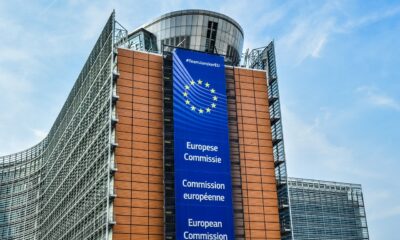Featured
European companies ahead of US in ESG ratings
Even before Directive No. 2014/95/EU on non-financial reporting went into effect in Europe, between 2011 and 2017, nearly two-thirds of the listed European companies considered in the analysis (62.29%) prepared sustainability reports according to the Global Reporting Initiative (GRI) framework while less than half (44.86%) of U.S. companies did so.

The European Union has been moving towards sustainable transition for some time and the pace has now accelerated, first with the European Green Deal (EGD) and then with the strong green (e.g. Next Generation EU) and social (e.g. Sure) connotations included in the recovery programs from the COVID-19 crisis. Optimists believe that in addition to being necessary to safeguard the future, becoming sustainable gives Europe a real competitive advantage in a world where demand will increasingly shift from consumption to green products and investment in financial assets issued by sustainable enterprises. Pessimists, on the other hand, believe that the EU sustainable transition policy imposes exorbitant and unjustified costs.
Who is right? Let’s try to answer this question by assessing whether European companies have gained an advantage over their US counterparts, held back also by the Trump interlude, in a very emblematic and dynamic segment, that of sustainable finance.
Read more about sustainable finance and find the latest financial news with the Born2Invest mobile app.
Sustainable finance consists of various components:
The most dynamic is that of SRI funds – Sustainable & Responsible Investment Funds – whose investment strategies typically use ESG ratings. This is a fast-growing area, and current estimates place ESG investment at stratospheric levels: it could reach $35 trillion by 2025. So, given this soaring growth, competitiveness today also depends on how well companies are positioned to tap into sustainable finance markets. In fact, a company’s ESG rating measures its performance in managing environmental (E – Environmental), social (S – Social) and governance (G – Governance) risks.
Well, comparing U.S. companies listed on the S&P500 with a similar group of European companies listed on the stock exchange, it shows that on average EU listed companies enjoy ESG ratings 14% higher than U.S. companies (64.43 for European versus 56.37 for the U.S.). Breaking this down, the advantage of European companies is highest in the E-Environmental component (+22.5%; 63.08 vs. 51.48), intermediate in the S-Social component (+16.0%; 68.35 vs. 58.90), and negligible in the G-Governance component (+0.4%; 59.88 vs. 59.66). In addition, it is shown that the EU advantage does not depend on the different sectoral composition of EU companies as a whole, which, at most, would assign European companies +0.64% over US companies. Instead, it is found that the EU advantage is related to the fact that EU companies more often than their U.S. counterparts engage in sustainability reporting and provide better quality sustainability reports.
In fact, even before Directive No. 2014/95/EU on non-financial reporting went into effect in Europe, between 2011 and 2017, nearly two-thirds of the listed European companies considered in the analysis (62.29%) prepared sustainability reports according to the Global Reporting Initiative (GRI) framework while less than half (44.86%) of U.S. companies did so. Furthermore, estimating the quality of GRI reports – i.e. how much companies choose more or less advanced reporting methods – it is estimated that the average European report is 8.51% more accurate than the US one.
These results confirm that EU policies in favor of sustainability can pay off by offering European companies advantages in accessing sustainable finance. So, at least in this area, the optimists are right.
__
(Featured image by Derks24 via Pixabay)
DISCLAIMER: This article was written by a third party contributor and does not reflect the opinion of Born2Invest, its management, staff or its associates. Please review our disclaimer for more information.
This article may include forward-looking statements. These forward-looking statements generally are identified by the words “believe,” “project,” “estimate,” “become,” “plan,” “will,” and similar expressions. These forward-looking statements involve known and unknown risks as well as uncertainties, including those discussed in the following cautionary statements and elsewhere in this article and on this site. Although the Company may believe that its expectations are based on reasonable assumptions, the actual results that the Company may achieve may differ materially from any forward-looking statements, which reflect the opinions of the management of the Company only as of the date hereof. Additionally, please make sure to read these important disclosures.
First published in FIRST online, a third-party contributor translated and adapted the article from the original. In case of discrepancy, the original will prevail.
Although we made reasonable efforts to provide accurate translations, some parts may be incorrect. Born2Invest assumes no responsibility for errors, omissions or ambiguities in the translations provided on this website. Any person or entity relying on translated content does so at their own risk. Born2Invest is not responsible for losses caused by such reliance on the accuracy or reliability of translated information. If you wish to report an error or inaccuracy in the translation, we encourage you to contact us.

-

 Biotech1 week ago
Biotech1 week agoUniversal Nanoparticle Platform Enables Multi-Isotope Cancer Diagnosis and Therapy
-

 Fintech2 weeks ago
Fintech2 weeks agoRuvo Raises $4.6M to Power Crypto-Pix Remittances Between Brazil and the U.S.
-

 Impact Investing5 days ago
Impact Investing5 days agoMainStreet Partners Barometer Reveals ESG Quality Gaps in European Funds
-

 Biotech2 weeks ago
Biotech2 weeks agoEurope’s Biopharma at a Crossroads: Urgent Reforms Needed to Restore Global Competitiveness

























